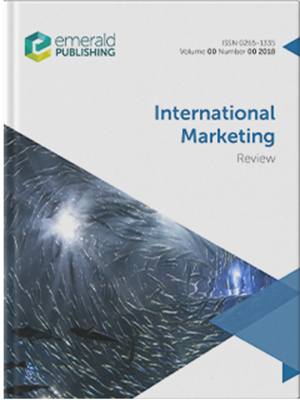出口商如何以及何时从国际适应战略中受益?正式和非正式制度距离的调节作用
IF 4.6
3区 管理学
Q1 BUSINESS
引用次数: 10
摘要
目的:利用制度理论,本研究试图促进对出口商采用国际适应战略通过增强合法性对出口绩效的间接影响如何受到与东道国市场的正式和非正式制度距离的不同调节的理解。设计/方法/方法从251家中国出口商中收集调查数据,并使用多元回归模型对假设进行分析。发现出口商对国际适应战略的使用影响其合法性认知,进而影响其出口绩效。此外,正式制度距离通过合法性强化了国际适应战略对出口绩效的间接影响,而非正式制度距离则削弱了这种间接影响。独创性/价值本研究有助于从制度角度了解出口商采用国际适应战略如何以及何时有利于出口绩效。本文章由计算机程序翻译,如有差异,请以英文原文为准。
How and when do exporters benefit from an international adaptation strategy? The moderating effect of formal and informal institutional distance
PurposeDrawing on institutional theory, this study seeks to advance the understanding of how the indirect effect of exporters' adoption of an international adaptation strategy on export performance via enhanced legitimacy is differently moderated by formal and informal institutional distances from the host country market.Design/methodology/approachSurvey data were collected from a sample of 251 exporters in China and analyzed with a multiple regression model to test the hypotheses.FindingsExporters' use of an international adaptation strategy affects their perceived legitimacy, which in turn influences their export performance. Moreover, formal institutional distance strengthens the indirect effect of an international adaptation strategy on export performance via legitimacy, whereas informal institutional distance weakens this indirect effect.Originality/valueThe study contributes to the knowledge of how and when adoption of an international adaptation strategy by exporters benefits export performance from an institutional perspective.
求助全文
通过发布文献求助,成功后即可免费获取论文全文。
去求助
来源期刊

International Marketing Review
BUSINESS-
CiteScore
8.70
自引率
12.00%
发文量
55
期刊介绍:
International Marketing Review (IMR) is a journal that has, as its core remit, the goal of publishing research that pushes back the boundaries of international marketing knowledge. IMR does this by publishing novel research ideas, and by publishing papers that add substance to, question the basic assumptions of, reframe, or otherwise shape what we think we know within in the international marketing field. IMR is pluralistic, publishing papers that are conceptual, quantitative-empirical, or qualitative-empirical. At IMR, we aim to be a journal that recognizes great papers and great research ideas, and works hard with authors to nurture those ideas through to publication. We aim to be a journal that is proactive in developing the research agenda in international marketing, by identifying critical research issues, and promoting research within those areas. Finally, IMR is a journal that is comfortable exploring, and that fosters the exploration of, the interfaces and overlaps between international marketing and other business disciplines. Where no interfaces or overlaps exist, IMR will be a journal that is ready to create them. IMR’s definition of international marketing is purposefully broad and includes, although is not restricted to: -International market entry decisions and relationships; -Export marketing and supply chain issues; -International retailing; -International channel management; -Consumer ethnocentrism, country and product image and origin effects; -Cultural considerations in international marketing; -International marketing strategy; -Aspects of international marketing management such as international branding, advertising and new product development.
 求助内容:
求助内容: 应助结果提醒方式:
应助结果提醒方式:


